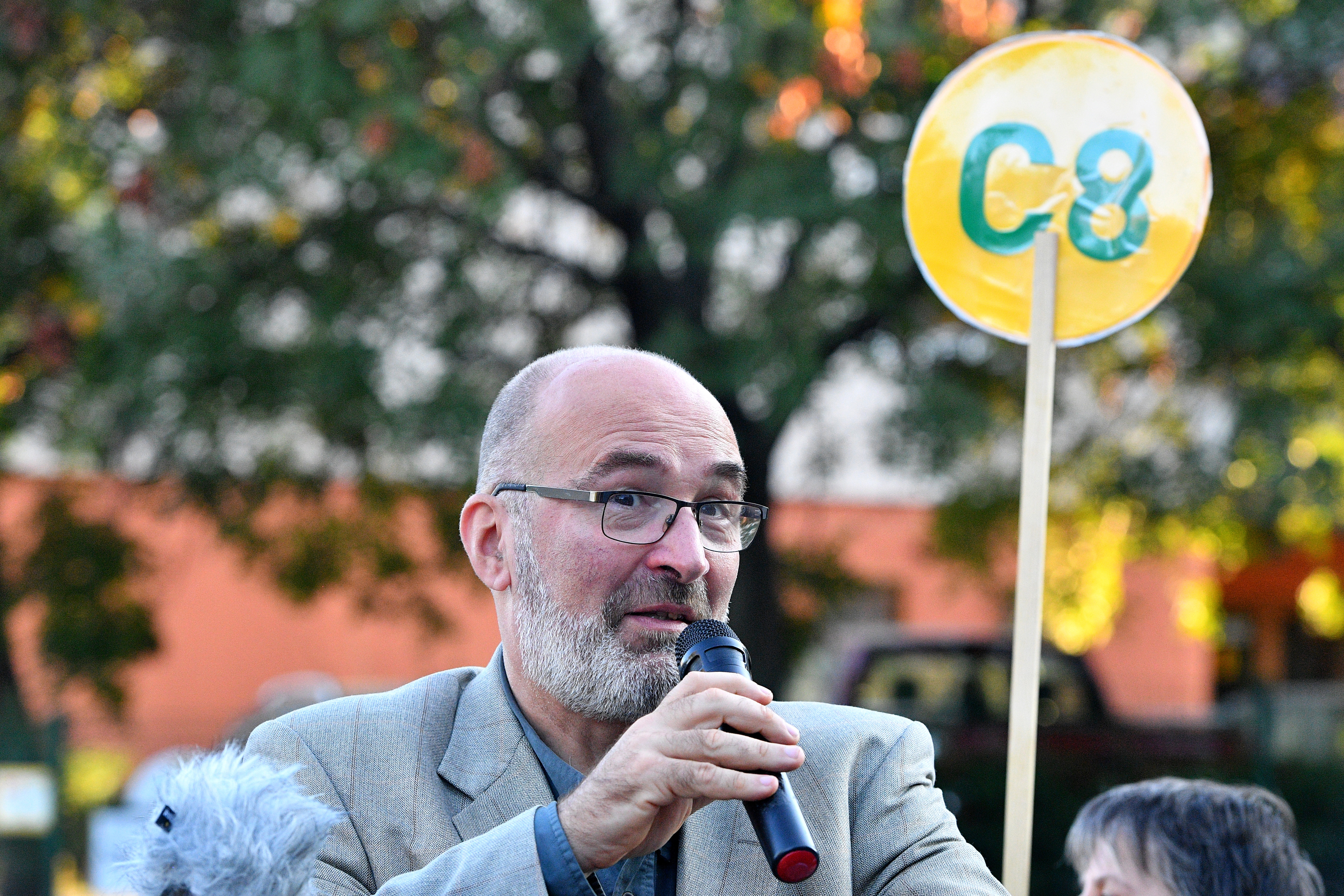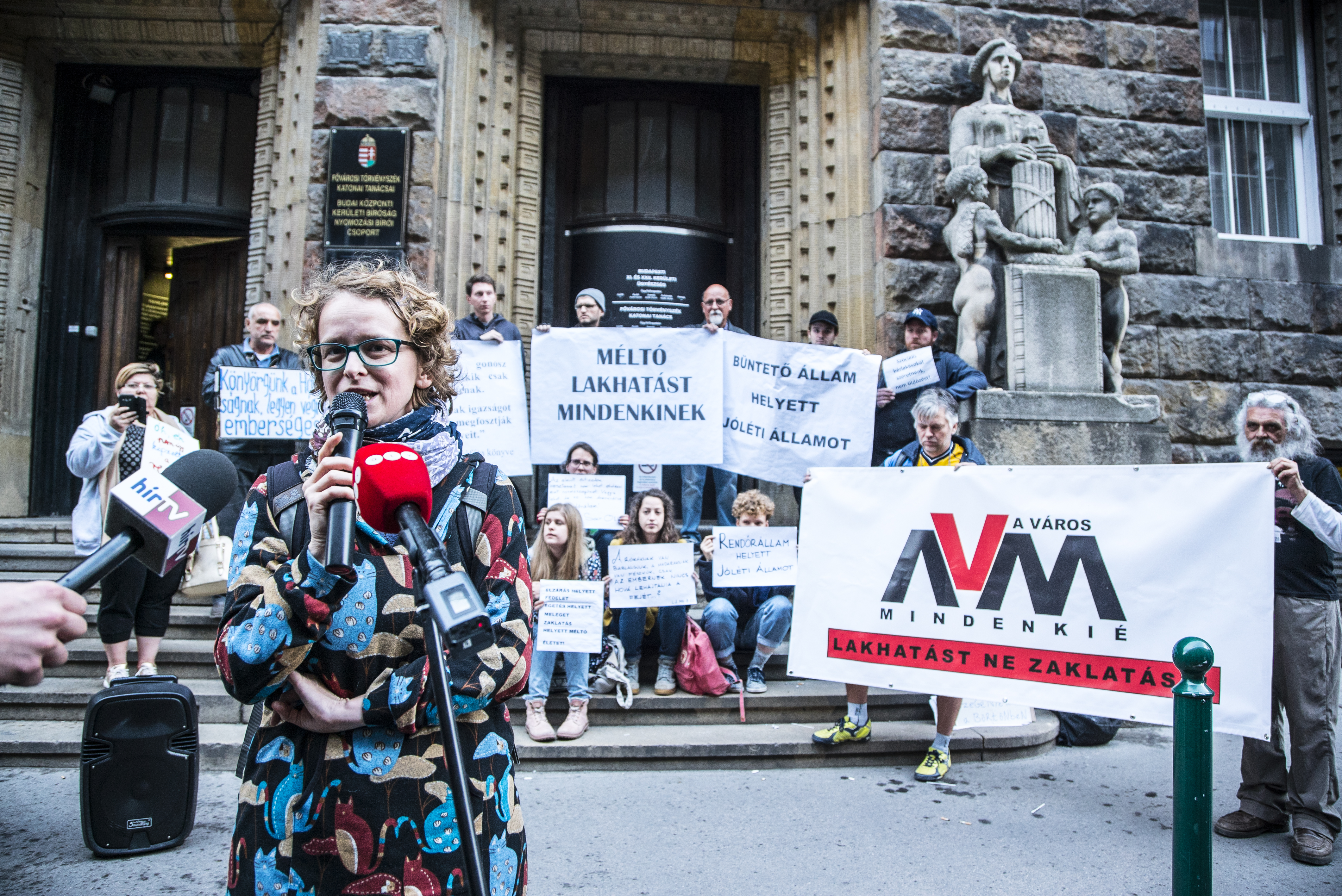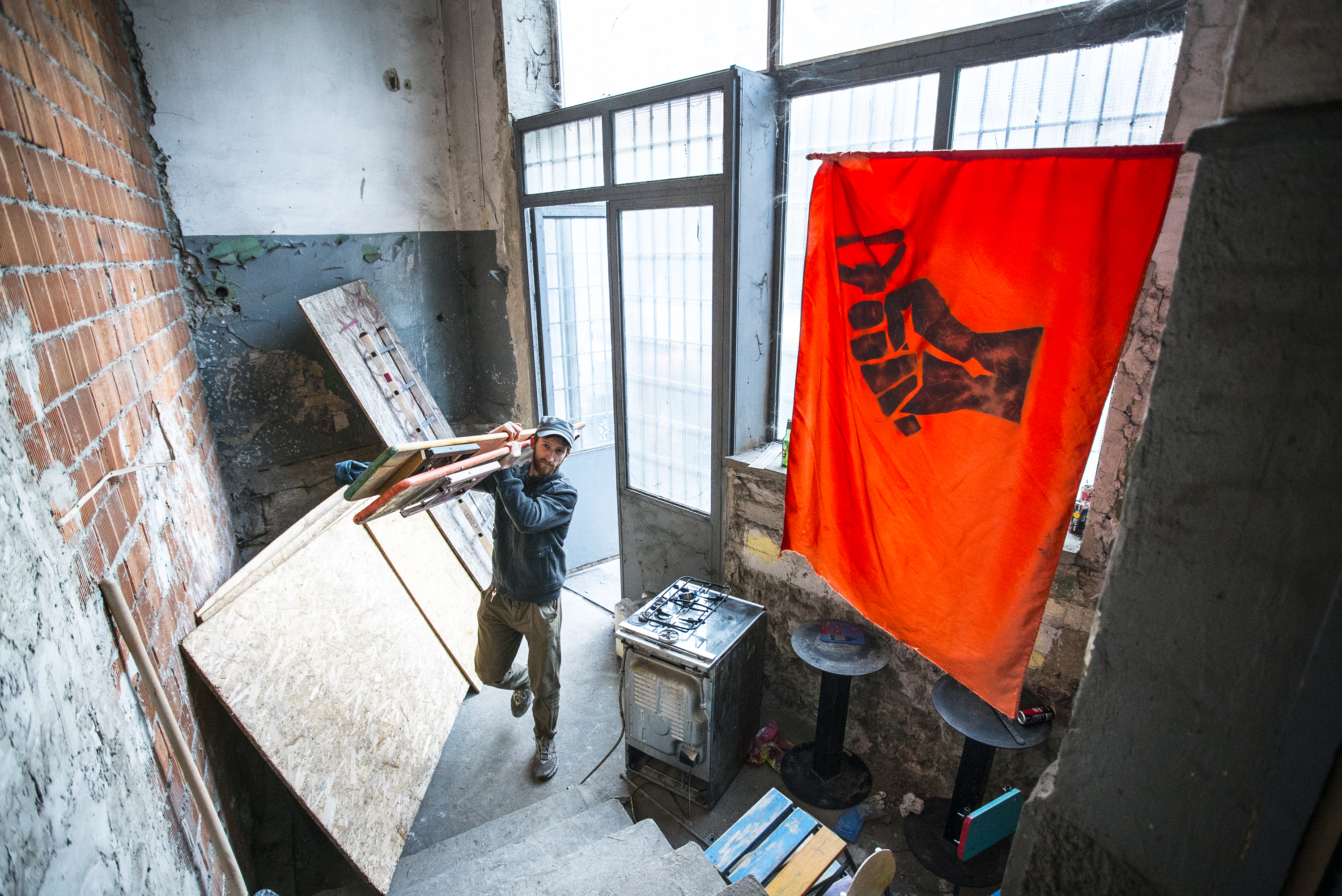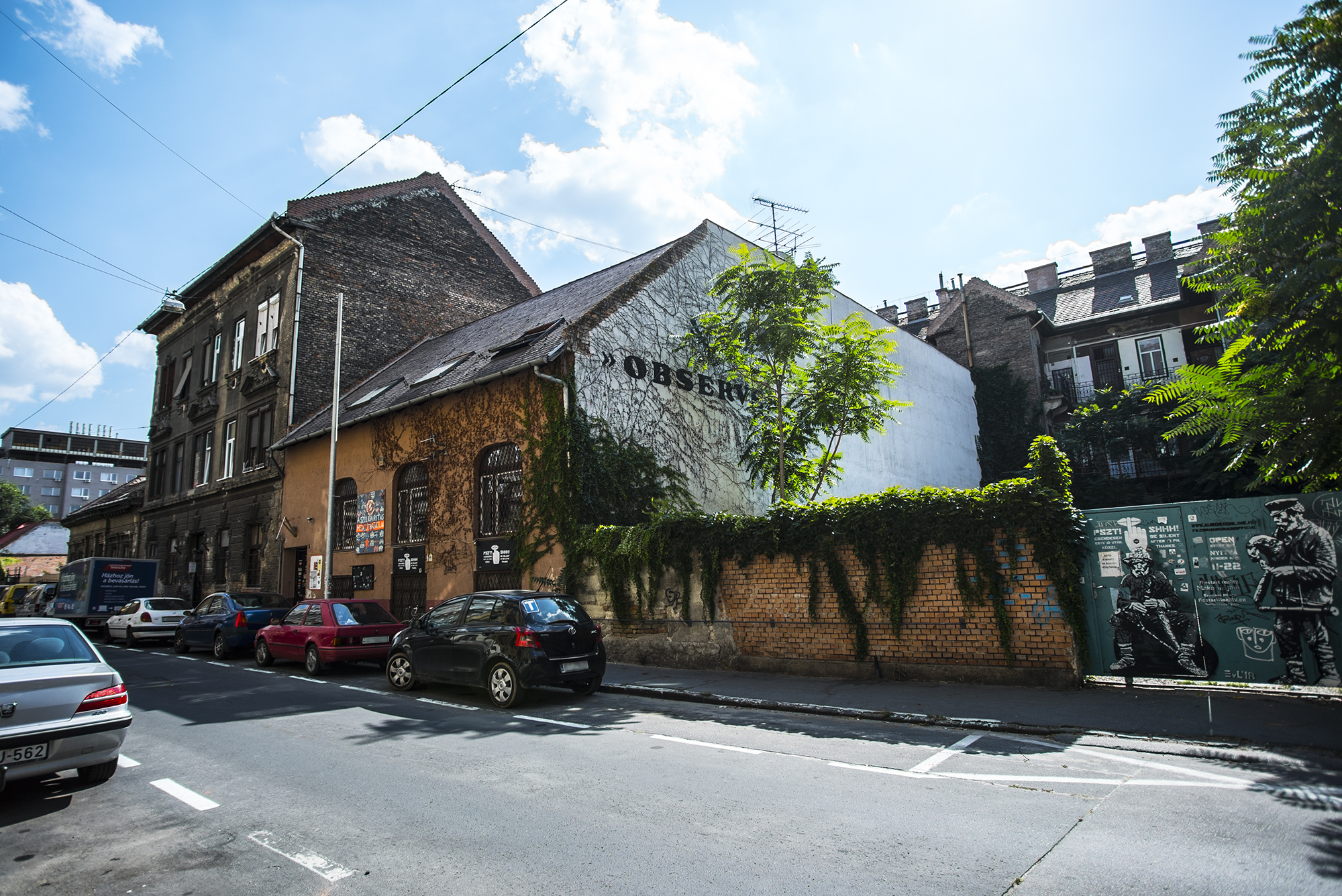"We need to replace them" - How a burgeoning grassroots culture changed the rules in the 8th District
- Stay updated on the latest news from Hungary by signing up for the free InsightHungary newsletter:
At a public meeting of Budapest’s Eighth District government in December 2016, a member of an anti-eviction activist group addressed then-mayor of the district Máté Kocsis. She told the Fidesz mayor that her organization, A Város Mindenkié (The City is for All), opposed the district’s plans to privatize half of its public housing stock, and asked whether he could guarantee the sale of the housing would not lead to more evictions against which the group had long been fighting.
Responding to the woman’s question, Mayor Kocsis said,
The victory of Pikó, a journalist and activist with no ties to Hungary’s opposition parties, seemed particularly significant in the Eighth District. It was here that much of the organizing of a new, left-wing grassroots movement had been undertaken in the previous decade, much of which refused to incorporate into electoral processes, but parts of which provided important organizational support, experience and tactical know-how to Pikó’s campaign.
Pikó himself had been an activist in the working class district since 2014, assisting a food distribution program for needy residents, and was a founder of C8, an independent local civic initiative. As municipal elections approached in 2019, members of C8 urged him to run for mayor, and the organization ultimately conducted his campaign and authored his electoral program.
The team that rallied around Pikó included prominent figures from the grassroots community like Tessza Udvarhelyi, a long-time organizer with The City is for All who spent 15 years as a housing activist in Budapest before becoming Pikó’s campaign coordinator, and later, a member of his cabinet.
Udvarhelyi co-founded The City is for All in 2009 as a network of homeless, formerly homeless and non-homeless activists advocating for the rights and interests of homeless people and those facing housing insecurity. The group conducts media campaigns to increase awareness of Hungary’s homelessness problem, puts pressure on authorities to improve social housing policy, and engages in acts of civil disobedience (its activists have often locked themselves together to prevent forced evictions).
In her years of work with the group, Udvarhelyi observed that while they had been able to improve the lives of individual people and contribute to a shift in liberal political discourse, they were unable to force major changes in policy on an institutional level.
“Every leftist politician today thinks that the housing crisis is a fact that the state must take responsibility for, which I attribute to our activities,” Udvarhelyi said. “But at the level of policy, we’ve hardly been able to achieve anything over ten years.
Udvarhelyi said there was a political vacuum in the Eighth District that she thought a grassroots movement could fill. Fidesz seemed to consider the district a reliable possession, while the opposition parties wrote it off as a lost cause: the Democratic Coalition, for example, has no local office in the district despite being the country’s strongest opposition party.
The status of C8 as a civic organization and not a party gave it the leeway it needed to conduct an independent campaign and author a new kind of program that was unconstrained by status-quo party interests. Pikó’s team, in case of victory, would have a stronger position from which to implement its own policy than would, for example, Budapest Mayor Gergely Karácsony, who had to make concessions following his election in exchange for the support of the Democratic Coalition, the Socialist party and others.
Filling the void
This insurgent approach to reforming liberal politics by undercutting the ideological consensus and funding mechanisms of mainstream parties resembled a bottom-up movement in the United States which has been delivering congressional seats to working-class, left-wing outsiders. Alexandria Ocasio-Cortez, a former waitress and bartender from the Bronx and a member of the Democratic Socialists of America, defeated a ten-term centrist Democrat to become the youngest woman ever elected to the US congress, while Bernie Sanders – the first self-describing socialist to run for US president since Eugene Debs a century ago – appears to be a frontrunner in the Democratic party’s race to nominate a presidential candidate. Support for such left-wing candidates has been accompanied by a push from the left to recast the Democratic Party, and by the substantial growth of political alternatives: membership in the Democratic Socialists of America, for example, has grown from 7,600 just before the election of President Donald Trump in 2016 to over 56,000 in November 2019.
Just as the Democratic Party in the US faces an unprecedented challenge from its left which aims to confront its entrenched, elite leadership, Udvarhelyi sees a parallel movement brewing in Budapest to supplant what she called the “emptiness” of the liberal opposition.
“The parties are so hollowed out that there is this void, and there’s no one else to enter but grassroots organizations and activists. I think using these kinds of organizational models is the only way for the national opposition to rejuvenate and for leftist and liberal politics to be changed.”
Udvarhelyi took inspiration from left-wing movements in the United States and Western Europe as she developed her tactics of direct outreach and door-to-door campaigning. She met with representatives of the Working Families Party, a progressive American political party that has played a significant role in pulling the Democrats to the left, and met with and volunteered for Ada Colau, a housing activist and organizer who was the first woman ever to be elected mayor of Barcelona. She credits the tactics she learned from such movements, and from her work in The City is for All, with the success of the campaign she ran in the Eighth.
“I’m pretty sure that if it had been the [mainstream] parties that led this campaign, we probably would have lost,” she said.
"We're gathering strength"
The growth of the ‘new left’ in Budapest largely coincided with the radical narrowing of avenues for political participation overseen by Fidesz after 2010. Under Prime Minister Viktor Orbán, the party used its parliamentary supermajority to adopt a new constitution in 2011 and create a new electoral framework in 2012, rendering the political opposition largely impotent in its parliamentary work and helping to give Fidesz three straight supermajority victories in national elections.
Meanwhile, liberal opposition parties made attempts to forge pacts of cooperation, such as the Unity alliance in 2014, but each failed to build durable organizational structures or mobilize mass support that could challenge Fidesz’s supremacy. Schisms within the parties further weakened and atomized the opposition, as when the Democratic Coalition split from the Socialist party in 2011 or the micro-party Dialogue broke off from green party Politics Can Be Different in 2013. By the time 2014 parliamentary elections came around, Fidesz easily maintained its two-thirds majority and defeated both the liberal coalition and the radical right-wing Jobbik party.
What followed was a period of disaffection with the liberal opposition as the left-of-center opposition parties lost almost 150,000 voters between 2014-2018 while Fidesz picked up nearly 600,000 in the same period. Gergő Birtalan, a member of the Gólya cooperative in the Eighth District, said that after 2014 many young, politically active Hungarians began to see attempts to influence politics through traditional means as a dead-end. It seemed as if party politics, lobbying, and even street protests had failed to influence the ruling party.
“Fidesz is relentless,” Birtalan said. “Some people think that if you put 100,000 people on the street then an elected official will think, ‘They won’t vote for me next time so I’ll do something different.’ But Fidesz made it evident that this will never happen.”
The City is for All, he said, spent years lobbying the government to exempt families with children from forced evictions. “This was a very reduced version of their overall goal of not evicting anyone ever, but even this was met with complete indifference from the government.”
To counter these policies and the unresponsiveness of the political establishment, a movement began to take shape which aimed to form an autonomous pole on the margins of a mainstream political culture plunging into right-wing totalitarianism. This movement, divorced from both the right-wing populism of Fidesz and the neoliberalism of some of the opposition parties, set out to use horizontal, democratic organization to confront issues around housing inequality (From Streets to Homes Association, Periféria Center), homelessness and gentrification (The City is for All, Utcajogász), migrant and refugee rights (MigSzol), feminism (NEM!, Nők Rojaváért), environmental action (Extinction Rebellion Magyarország), education (Hallgatói Szakszervezet, Szabad Egyetem and movements within the National Teachers’ Union) and the creation of a solidarity economy.
This movement’s adherents largely eschewed electoral politics, pursuing instead a strategy of institution-building which they hoped could provide for the common welfare and represent a solidarity-based, sustainable alternative to mainstream politicking.
“We are trying to communicate in other, more personal networks, and through projects that we’re building,” said Birtalan of the Gólya cooperative. That model of abstaining from mainstream politics, he added, protects the cooperative from polarizing political processes “in which one side identifies you as an enemy and the other side identifies you as an ally. Right now we’re not looking for enemies because we’re gathering strength.”
Gólya, a worker cooperative near Orczy tér in the Eighth District, has been a major actor and facilitator in the formation of Budapest’s grassroots left. It hosts a concert space, bar, daycare center, kitchen, and training gym, and provides office space for seven allied organizations.
On the second floor of Gólya’s newly-opened building are seven repurposed doors, each one opening to the office of an allied organization. Behind one of those doors is the Periféria Policy and Research Center, a group of social scientists and urban researchers that study housing inequality and other related issues, author policy proposals, and lobby local governments for equitable housing policy.
Csaba Jelinek, one of the organization’s founding members, described why Periféria, like Gólya, is cautious in how it engages with mainstream political processes.
“A lot of people have realized that if you want to follow this kind of politics, a really important step is building institutions of our own. Without having our own institutions in this movement, we won’t survive,” Jelinek said. “There are other larger institutions with very different political aims which suck you in, chew on you and spit you out. Without a more stable institutional infrastructure, it’s impossible to exist and follow your political goals in this setting.”
In the building of this institutional infrastructure, Gólya has consistently lent active support to grassroots organizations, but it is careful not to be associated with any political candidate or campaign. Pikó’s team, for example, was not permitted to hold events or rallies there.
“We’re of course relieved that we will not be persecuted by the local municipality with the help of the police force and neo-fascist gangs, like they did with [Eighth District community center] Auróra, so this is actually a positive change for us,” Birtalan said of Pikó’s win. “We’re regarding the work of the new local government with much curiosity, but we’ll see what it means for us aside from the lack of persecution.” (Dozens of members of the neo-fascist group Hungarian Legion attacked Auróra in October 2019, and under Fidesz’s control of the district, police were routinely dispatched to the community center which brought it to the brink of closure. Pikó has since pledged he would support Auróra’s continued operation.)
The Eighth District was both the geographical heart of this heterogeneous movement and a testing ground for many of its initiatives, as well as a laboratory that Fidesz used to experiment with what Udvarhelyi called “vicious anti-poor policies”. Forced evictions (some 300 from district-owned apartments took place in less than two years in 2014-2015), the privatization of municipally-owned housing stock and the criminalization of homelessness were all spearheaded in the Eighth by mayor Máté Kocsis and continued by his successor Botond Sára.
After years of working to oppose and mitigate such policies, activists like Udvarhelyi and fellow housing activist Vera Kovács expanded on their strategy and joined the Pikó campaign, bringing with them the tactics they’d developed from years in the field of direct action. Kovács estimated that as much as half of Pikó’s campaign team came from housing activist groups.
Both Birtalan of Gólya and Jelinek of Periféria insist that while they personally favor working through autonomous organizations, they do not fundamentally oppose grassroots groups pursuing change through winning local elections. Such victories, after all, can lead to substantial changes: after Pikó’s win, for example, he eased pressure on Auróra and pledged to bring an end to evictions in the district.
Jelinek said recent electoral victories had created a “window of opportunity, and it’s much wiser if institutional party politics and the more grassroots movement type of politics can work together, but not necessarily integrate into one another.”
Udvarhelyi takes a similar approach: she said she sees the difference in tactics not as two strategies at odds, but “as a division of tasks”.
“It’s really important that there are people that are building autonomous spaces and institutions, but it’s also important to have organizations that are more open to politics,” she said. “If we leave politics to the people that have been doing it for the past 30 years, nothing good will come of it.”
A debate is taking place among activists on why (or why not) to seek change through elections, Udvarhelyi said. The result could be a two-pronged grassroots left, with one side holding the line of “building organizations, knowledge and material institutions” (as Birtalan put it), and the other drawing upon that knowledge to get inside the political process and – even if only in local contexts – seizing institutional power.






